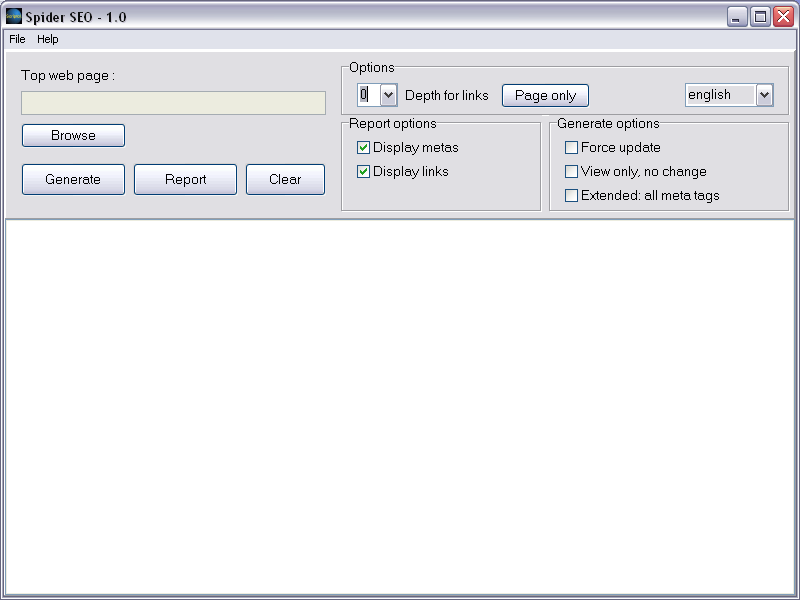Spider SEO
© 2003-2015 by Denis Sureau
https://www.scriptol.com
Free open source software under the GNU GPL licence
SpiderSEO is a script with a graphical user interface, that
generates automatically meta tags from the content of web pages of an Internet
site. Keywords and description are taken from the content of the page. Other
metas are generated optionally. The script works on a local image of the
website and not online but may be adapted.
Introduction
The cleaner is your code, the more the program has chance to work well. For an example of what I consider a clean code, and a garbaged one, look at lines below:<head> <meta name="keywords" content="order, clarity"> </head> <head > < meta nick = "keyword" content = confusion disorder > < /head>
In the case your code is so garbaged, the resulting code produced by SpiderSEO
may not be what you expect.
The SpiderSEO script is intended to work on a local image of your site (if
your computer is your own server, the local image is the site itself).
Before to use SpiderSEO, take care to make a copy of the whole directory that
holds files of the site.
The screen

The large text box displays reports and changes. Buttons and other widgets are detailed below.
Generate and report from the graphical user interface
In the first field, type the full path of the main page of your site, for example:
c:\site\index.htmlThen click on the "Generate" button to start the generating process.
Changes are displayed in the large text area.
To report the actual meta tags or links in your pages, click on the "Report" button.
The file menu
- The "browse" command allows to locate and select a page to parse.
- The "create list" command opens a dialog for creating a list of
pages to process. See below.
- Save: if you want to save the currently displayed results into a file.
- Exit: closes the program.
Creating a list
The graphical interface allows to create a list of links into a file, and
this file may be used as a main page to designate which pages to process.
The add button adds a page to the list.
The suppress button removes a page from the list.
The order of processing may be changed with the up and down
buttons.
Once the list is created, it is saved with the save button.
You can reload a list with the load button, and add more links.
The new button clears the list.
Type return to close the windows.
Once the list is created into a file, the name of this file should be typed
in the top textfield as main page to process and the depth must be set to
1 at least.
The help menu
- Manual: displays a short help.
- About the program...
Options in the graphical user interface
- Depth of links
This is the level of recursion for links found in pages.
If the value is 0, links are ignored.
If it is 1, links of the main page are parsed, but their links are ignored.
And so one... - Dictionary
Select the dictionary for foreign languages. - Force update
Replace the meta tag even if already created and filled. Not recommended, as manual creation is usually better than automatical one. - Display only
Create or update meta and display them, but pages are not really changed. - Extended metas
Default metas are "keywords", "description" and "robots".
This option add "created", "revisit","author". - Display metas
Display the metas. - Display links
Display links found in the page.
Generate options
Report options
Using the programs at command line
The graphical user interface actually calls programs you can use directly.
If your site is stored in the path c:\site, if the main page is index.html (this may be index.php, etc...), just type:
spider c:\site\index.html ...to generate the meta tags. metarep c:\site\index.html ...to report metas and links.
Options of command line tools
RecursionYou can limit the level of recursion with this option:
-r followed by the depth of recursion, 5 for example (default is 0).
spider -r5 c:\site\index.html
Force
-f replacing already existing meta tags.
The algorithm of generation or replacement is given at head of the source
spider.sol.
Test first
-v allows to view the results without changes in the files.
Display
-q no display.
Selecting pages to update with makelist
Makelist is a script that automatically builds a list of web pages inside
a directory. Once the list is built, you may edit it to choose the pages...
- Type:
makelist sitedirectory listname.html- sitedirectory is the location of the image of your site.
- listname.html is the name of the file that will hold the list of pages. - Edit the list and remove the files you want not to change.
- Use this generated file rather than the main page of the site.
The command is:spider listname.htmlor if you don't want the links parsed recursively beyond the pages in the list:spider -r1 listname.htmlThe -r1 flag gives a depth of 1 for recursion. The list itself is the depth 0 of recursion.
Foreign languages
To use SpiderSEO with another human language, you have to replace the small.enlist of useless words by the equivalent for this language.
A small.xx file may be easily created with the help of dictmake, a set of scripts available here.
Download
- Download Spider SEO.
Resources
- The Scriptol compiler. To compile the scripts to PHP or C++.
- Dictionary Maker. Scripts to help in building dictionaries.

